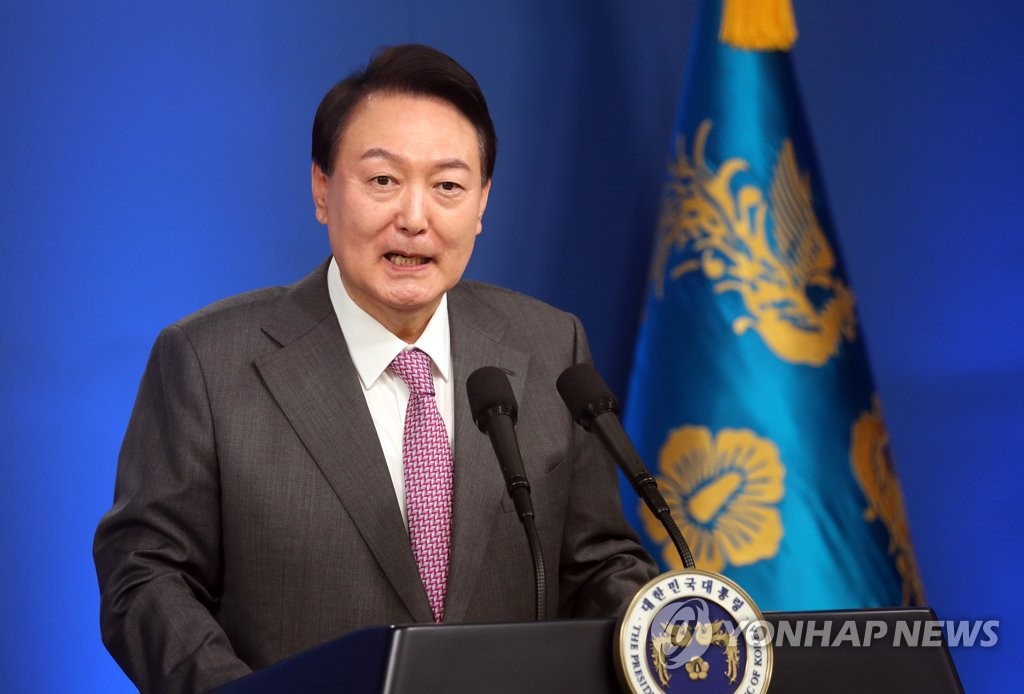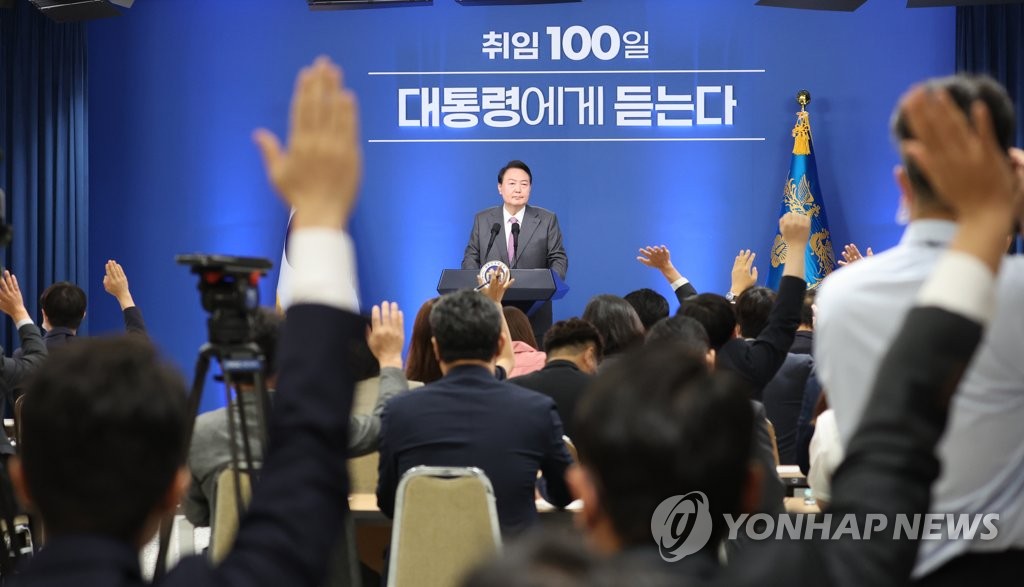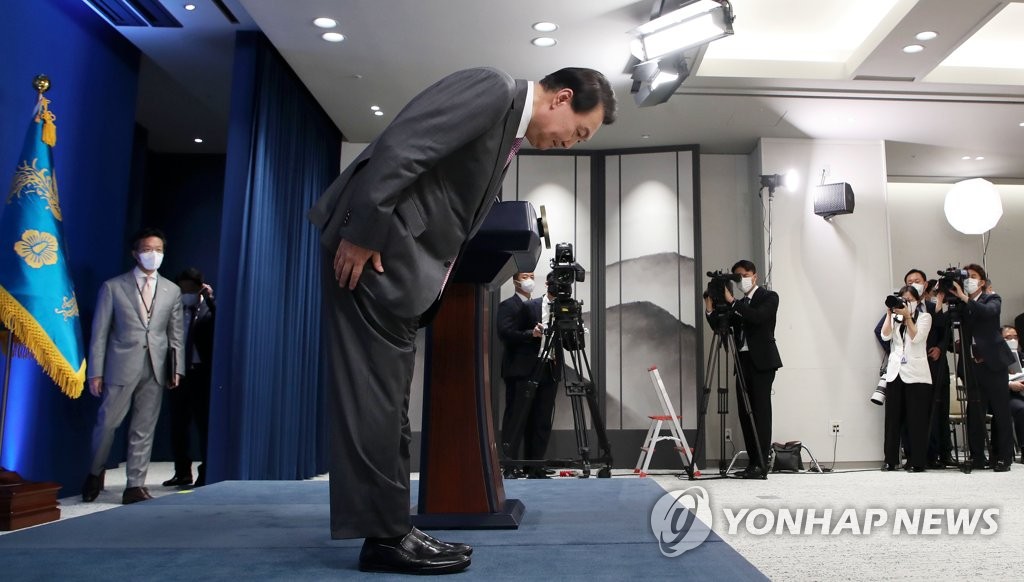- California Assembly OKs highest minimum wage in nation
- S. Korea unveils first graphic cigarette warnings
- US joins with South Korea, Japan in bid to deter North Korea
- LPGA golfer Chun In-gee finally back in action
- S. Korea won’t be top seed in final World Cup qualification round
- US men’s soccer misses 2nd straight Olympics
- US back on track in qualifying with 4-0 win over Guatemala
- High-intensity workout injuries spawn cottage industry
- CDC expands range of Zika mosquitoes into parts of Northeast
- Who knew? ‘The Walking Dead’ is helping families connect
Yoon offers to carry out aid projects as long as N.K. shows denuclearization commitment
President Yoon Suk-yeol said Wednesday South Korea has no hostile intentions toward North Korea and is willing to carry out aid projects for the impoverished nation as long as Pyongyang shows firm commitment to denuclearization.
The remarks, made in a press conference marking his 100 days in office, came days after he unveiled what he described as an “audacious” offer to rebuild the North’s economy if the regime takes substantial steps toward denuclearization.
“What I meant … was not that they have to complete denuclearization before we do something. What I meant was that as long as they demonstrate firm commitment, we will do what we can do to help them,” Yoon said, referring to his proposal unveiled in his Liberation Day address Monday.



President Yoon Suk-yeol holds a news conference at the presidential office in Seoul on Aug. 17, 2022, on the occasion of his 100th day in office. (Yonhap)
Yoon also made clear he holds no hostile intentions toward Pyongyang.
“Guaranteeing regime security is not something the Republic of Korea government can do,” Yoon said, using South Korea’s official name. “But neither I nor the Republic of Korea government wants the status quo changed unreasonably or by force in North Korea.”
Shortly after the press conference, South Korea’s military said it had detected two cruise missiles launched from North Korea into the Yellow Sea early in the morning, apparently in protest of South Korea-U.S. military exercises.
North Korea considers the combined exercises to be an invasion rehearsal and has claimed its nuclear weapons program is a means to guarantee regime survival in the face of “hostile” U.S. intentions.
The presidential office said National Security Adviser Kim Sung-han held a security meeting and was briefed on the launch by the Joint Chiefs of Staff. He also checked the military’s readiness posture.
Yoon’s “audacious plan” involves various programs that would be implemented in stages, including a large-scale food program, assistance for power generation, and infrastructure and port projects, in the event the North takes serious steps to denuclearize.
Yoon said it would also include providing diplomatic support to “normalize U.S.-North Korea, North Korea-U.S. relations.”
When asked if he plans to propose talks with the North in order to discuss his plan, Yoon said he has noted the need for dialogue with Pyongyang since his campaign.
“However, I said talks between the leaders of the South and the North and talks and negotiations between key working-level officials should not be a political show but helpful to the actual establishment of peace on the Korean Peninsula and in Northeast Asia,” he said during the press conference.
Yoon said the denuclearization roadmap he unveiled on Liberation Day is not the same as previous proposals because it does not require the North to fully dismantle its nuclear weapons program first but rather seeks a denuclearization commitment from the North.
“Only if we propose an agenda first can we wait for the other side’s response, and only then will it be possible to have meaningful meetings or talks necessary for the establishment of peace on the Korean Peninsula,” he said.
Yoon dismissed calls for South Korea’s own nuclear armament to counter North Korea’s nuclear development, saying he believes the Non-Proliferation Treaty regime is an important and essential premise for lasting world peace.
“That is why, under any circumstance, I plan to think of building more effective and stronger extended deterrence as a priority task,” he said.
On the historical disputes between South Korea and Japan, Yoon reiterated his belief that the two sides will be able to resolve them by strengthening “future-oriented cooperative relations.”
Regarding solutions to a dispute over the South Korean Supreme Court’s ruling ordering Japanese firms to compensate Korean victims of wartime forced labor, Yoon said the government is “deeply considering” ways to compensate the victims in a way that does not conflict with Japan’s sovereignty concerns.
“I’m optimistic,” he said.
On the possibility of providing lethal weapons to Ukraine to help its fight against Russia, Yoon declined to divulge details, saying only that the government plans to do its best to help the Ukrainian people regain freedom and recover their destroyed national assets at an early date.
Yoon opened his press conference by listing the accomplishments of his administration in its first 100 days in office, including its shift to a private sector-led economy, regulatory reforms and rebuilding of the alliance with the United States.
The press conference came as Yoon’s image has been badly in need of a makeover following weeks of falling approval ratings, mostly attributable to poor personnel choices in the presidential office and the government.
Yoon said he humbly upholds the public sentiment and will thoroughly look into the various problems that have been raised.











